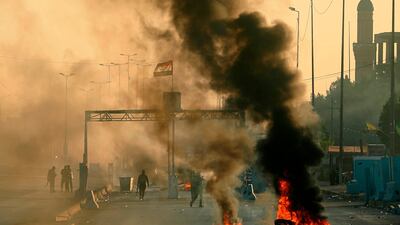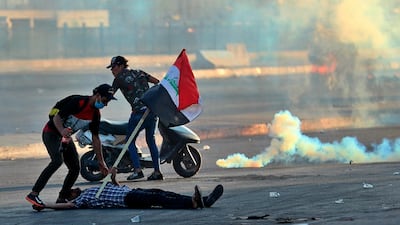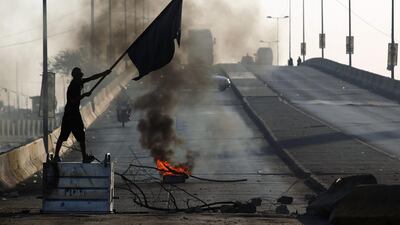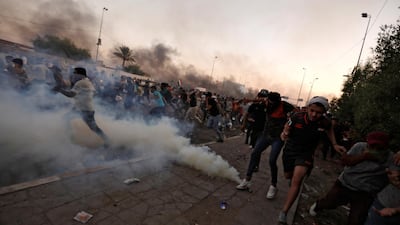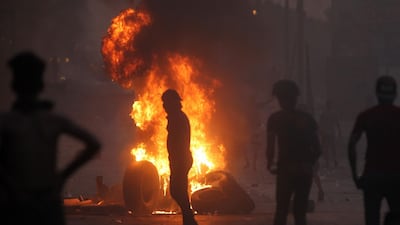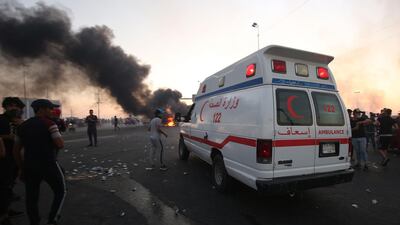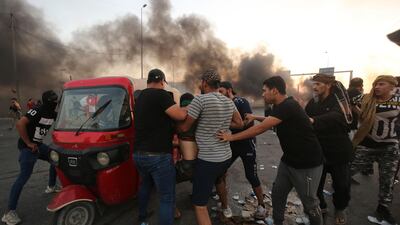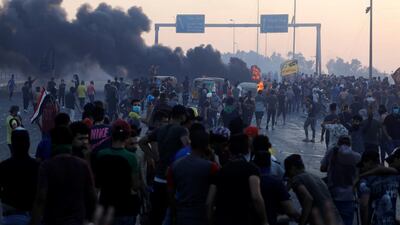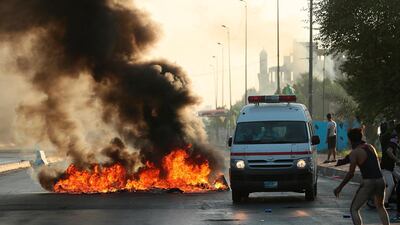Iraqi security forces targeted protesters on Sunday as the government announced a reform plan in its quest to calm public anger on the sixth day of unrest that left nearly 100 people dead.
Young men gathered on the outskirts of Baghdad, Sadr City and Nasiriyah in defiance of the government’s instructions to stay off the streets.
Security forces blocked the main roads and fired above the heads of protesters to prevent them from advancing.
Iraqi Prime Minister Adel Abdul Mahdi announced drastic reforms after demonstrators demanded jobs, improved services and a crackdown on corruption in the oil-rich country last Tuesday.
The government's 17 planned reforms include increased welfare payments for families in need, training programmes for over 150,000 unemployed graduates and non-graduates and the construction of 100,000 new housing units.
Yet the promises have done little to stop the violence on the streets.
The Iraqi High Commission for Human Rights, which is affiliated with the country's parliament, put the death toll at 99 on Sunday.
It said the number of people injured had reached 4,000 since Tuesday, after crowds of mostly young men took the streets.
Nearly 800 people have been detained since Tuesday, but about 450 have since been released.
Police snipers shot most of those killed in the last five days, and over 250 people were treated for sniper wounds in the capital.
The move sparked rallies in the south triggering a heavy crackdown from security forces.
It comes as protesters also destroyed posters of Iran's Supreme Leader Ayatollah Ali Khamenei, showing discontent with Iran's influence in their country.
Mr Abdul Mahdi’s plan will also designate those killed as “martyrs”.
The government also said on Twitter that those wounded during the recent protests would receive free medical treatment.
Mr Abdel Mahdi said the government is committed to "bringing corrupt individuals to justice". He called on officials to provide "all the necessary conditions for reforms in the country".
Baghdad's Mayor, Falah Al Jazaeri, resigned on Sunday, local media reported.
The violence has deepened the political and economic crisis that the country has been dealing with since the US invasion of 2003.
"We are protesting in a peaceful way in Baghdad. Why are our demands being met with bullets? We will keep marching and won't stop, no matter what the costs are," Ahmed Hussein, 22, a law graduate from Baghdad University, told The National.
However, politicians in Baghdad are sceptical that the changes promised by the government will be put into effect.
“The general situation is not stable and protests are continuing in Baghdad and in the southern provinces,” said Jaber Al Jaberi, a member of parliament.
The current government cannot resolve the crisis, he said.
He said the pledges made by Mr Abdul Mahdi would not calm the public's anger.
"It seems as though decision makers are in one sphere and what is happening in the country is in another," he told The National.
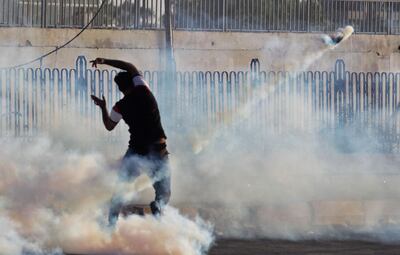
Scrambling to contain the demonstrations, Iraqi officials called an emergency session in parliament on Saturday to discuss the protesters' demands.
But they lacked the necessary numbers to make legal changes due to a boycott called by the populist cleric Moqtada Al Sadr, leader of the parliament’s biggest bloc.
On Saturday, armed groups attacked the offices of various media networks that are covering the demonstrations. It is unknown who the groups were affiliated to.
Gunmen dressed in black stormed the office of Al Arabiya, a Saudi-owned pan-Arab news channel, and beat up employees, the channel's Baghdad correspondent, Majed Hamid, said.
Other attacks were reported on Iraq's privately owned Dajla and NRT news channels.
